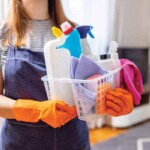Safer Degreasers: A Smarter Way to Clean Your Workshop
Keeping your workshop clean and free of grease is essential for safety, efficiency and professionalism. But traditional cleaning methods using harsh solvents can be hazardous for your health and the environment. Here’s where safer degreasers step in as a powerful and eco-friendly alternative for auto repair shops.
Degreasers are cleaning products specifically formulated to remove grease, grime and oil from surfaces.
What makes a safer degreaser?
A safer degreaser typically meets specific criteria to minimize health risks and environmental impact. Here are some factors to consider:
• Safer for Your Health: Safer degreasers are less toxic than traditional solvents, reducing the risk of respiratory problems and skin irritation. Look for products labeled “non-toxic” or “low VOC” (volatile organic compounds).
• Safer for the Environment: Water-based degreasers are often biodegradable and less harmful to dispose of compared to solvents.
• Effective Cleaning: Safer degreasers are powerful at cutting through tough grease and grime, leaving your tools, parts and floors sparkling clean.
• Reduced Costs: Safer degreasers can be more cost-effective in the long run. They may be concentrated, requiring less product per use, and some water-based degreasers are reusable.
• Improved Work Environment: Some employees find safer degreasers are less harsh on your skin, have less odor and make the workplace a more pleasant workspace.
Choosing the Right Degreaser:
Consider these factors when selecting a degreaser for your shop:
• Cleaning Power: Match the degreaser strength to the cleaning task. Heavy-duty degreasers are ideal for engine parts, while milder options work well for tools and floors.
• Application: Choose a degreaser form that suits your needs, such as spray bottles, wipes or concentrated solutions for dilution.
• Safety: Always prioritize safety. Read product labels carefully, (check the fine print – the parts number – to make sure you’re getting the product you want).
• Invest in PPE: Safety glasses, gloves and respirators (if necessary) are essential for safe use.
• Train Employees: Educate your staff on the proper use and safety precautions when handling degreasers.
• Readily Available: Safer degreasers are widely available at auto parts stores and industrial cleaning suppliers. Some suppliers may allow potential customers to test out water-based parts washer systems before they buy. This can help you experience the cleaning power and see if it’s a good fit for your needs.
Success Story: Leech Lake Band of Ojibwe Air Quality Program
The Leech Lake Band of Ojibwe Air Quality Program partnered with the Minnesota Technical Assistance Program (MnTAP) to assess degreasing products used at auto shops. The project aimed to encourage shops to switch to degreasers that are better for employee health and air quality.
The project results were positive. Here are some key takeaways:
• 13 out of 21 Shops Switched: Many shops found effective safer alternatives.
• Reduced Emissions: The Community Service Garage significantly reduced annual VOC and HAP emissions by using a low VOC brake cleaner and a degreaser formulation.
• Less Waste: The shop also reduced brake cleaner consumption by 80 percent, leading to less solid waste.
This project demonstrates that effective and safer degreasers are available.
Need help?
If you’d like to investigate safer alternatives for your cleaning products, MnTAP offers free technical assistance to small and medium-sized Minnesota businesses. Contact Jane Paulson at (612) 624-1826 or e-mail: janep2@umn.edu. You can also visit MnTAP’s website: mntap.umn.edu/industries/air/degreasing.html (to find safer products and ingredients to avoid)
Contact the MPCA Small Business Environmental Assistance Program for confidential assistance on regulatory matters at: (651) 282-6143 or e-mail smallbizhelp.pca@state.mn.us.
Want more? Check out the August 2024 issue of AASP-MN News!

